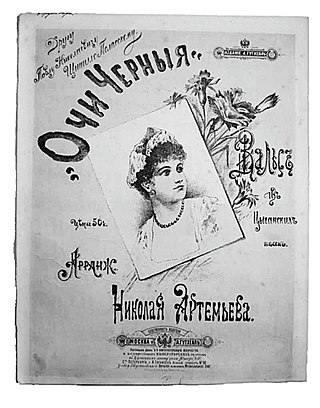Top Qs
Timeline
Chat
Perspective
Dark Eyes (Russian song)
Russian song with lyrics by Yevhen Hrebinka From Wikipedia, the free encyclopedia
Remove ads
"Dark Eyes" (Russian: Очи чёрные, romanized: Ochi chyornye, lit. 'Black Eyes') is a well-known and popular Russian romance (sentimental art song). The lyrics were written by the poet and writer Yevhen Hrebinka and first published on 17 January 1843. The melody associated with the lyrics has been borrowed from the "Valse hommage", Op. 21 for piano, written by Florian Hermann and published in 1879.

The Russian singer Feodor Chaliapin popularized a version of "Dark Eyes" with changes to the lyrics and additional verses.[1] Another popular version was written by the Italian-born British composer Adalgiso Ferraris, and first published in 1910 as "Schwarze Augen" ("Black Eyes").[2][3] The song became one of his major successes in the 1920s and 1930s; his version was played by Albert Sandler and Leslie Jeffries in 1939,[4][5] and sung by Al Bowlly, with lyrics by Albert Mellor, as "Black Eyes" in 1939.[6][7][8] Max Jaffa also recorded a version of the song in 1967.[9]
Remove ads
Composition
Summarize
Perspective
The lyrics were written by the poet and writer Yevhen Hrebinka, born in Poltava, now in Ukraine. The first publication of the poem was in Hrebinka's own Russian translation in Literaturnaya Gazeta on 17 January 1843. The lyrics were published in a songbook in 1874,[10][11] but its melody was not included in the publication.

The melody now associated with the lyrics has been borrowed from the "Valse hommage", Op. 21 for piano, written by Florian Hermann, a composer of German-Polish origin active in the Russian Empire.[12] The Op. 21 was published in 1879.[13] In The Book of World-Famous Music: Classical, Popular, and Folk (2000), James Fuld reports that a Soviet musicologist told him that the song is not "a Russian traditional song but a cabaret song", published in 1884 and reprinted as number 131 in a songbook by A. Gutheil in 1897, where it is described as a "Gypsy romance based on the melody of Florian Hermann's Valse Hommage".[14][15]
There are a number of variations on the song lyrics, including a version rewritten by Feodor Chaliapin, who dedicated the song to his future wife.[1] Chaliapin had performed the song with Rachmaninoff on piano.[16] Chaliapin's version became a typical example of gypsy-style Russian romance, and Rachmaninoff valued in particular a recording of the song by Chaliapin.[17][18]
Another popular version of "Dark Eyes" was written by Adalgiso Ferraris, who had spent many years in Russia before 1915, and was published while he was still in Russia in 1910, in collaboration with the German editor Otto Kuhl, as "Schwarze Augen" ("Black Eyes").[2][3] Ferraris then published it again in 1931, in affiliation with Paris Editions Salabert and with Jacques Liber, as "Tes yeux noirs (impression russe)"[19] on 9 October 1931.[2][20] The English lyrics were written by Albert Mellor.[6] Ferraris himself can be seen in a British Pathé film from 1934 of Alfredo and his Gypsy band playing "Dark Eyes", sitting in the orchestra behind the lead Alfredo.[21]
In Rebeca Chávez's 2010 documentary, Cuando Sindo Garay visitó a Emiliano Blez, Sindo Garay (born in 1867) claimed authorship of the melody.[22][better source needed] According to Garay, the melody of "Ojos negros que fascinan", a bolero, was composed by him upon request, for a Russian choir-girl with beautiful and expressive eyes, when an Opera company from Russia came to visit Cuba in the 1890s. Garay stated that “the melody of "Ojos negros" ("Dark Eyes") went back to Russia with the musicians and it was not until many years later that he found out through a friend that the song was part of the soundtrack of a Russian film playing at the local theatre. Garay was pleased to know that his music was worthy of such merit.[23][24]
Remove ads
Poem (original version by Hrebinka)
Remove ads
Lyrics (Chaliapin version)
In popular culture
Summarize
Perspective
A part of the song is featured in the 1936 screwball comedy film My Man Godfrey, in which the protegé Carlo (played by Mischa Auer) accompanies himself on the piano, crooning the beginning of the song several times in a schmaltzy manner.
The song is featured in the 1940 film The Shop Around the Corner, in which employees of a store (played by James Stewart, Margaret Sullavan and Frank Morgan) argue over whether to sell a cigarette box that plays the song when opened. Part of the tune is also used at the very beginning of the orchestral score before the opening credits.
The 1942 film Lady From Chungking features a scene in which Lavara, the nightclub singer (played by Mae Clarke), performs the song for the benefit of the Japanese General Kaimura (played by Harold Huber).[25]
On July 28, 1942 Spike Jones and His City Slickers recorded "Hotcha Cornia", a medley of this song and "The Song of the Volga Boatmen" which was arranged by Del Porter and Spike Jones. It was also featured in the 1943 film Thank Your Lucky Stars with Spike Jones and His City Slickers.[26] In the 1943 Mexican film El Circo, El Zapatero, played by Cantinflas, often sings it to himself.
The 1947 film It Happened in Brooklyn features a scene wherein Frank Sinatra and Jimmy Durante sing the song as a warm-up for Sinatra's character, who hopes to get a job as a song plugger at a music store.
In David Cronenberg's 2007 neo-noir gangster movie Eastern Promises the song is performed on an accordion in the main antagonist's Russian restaurant during a family gathering.
In Romantics Anonymous (2010), The love interest sings a French translation of the song in a restaurant.
Remove ads
See also
- The Red Army Choir, compilation album that includes Dark Eyes
- Panon Hideung, a Sundanese folk song derived from Dark Eyes
References
Sources
External links
Wikiwand - on
Seamless Wikipedia browsing. On steroids.
Remove ads

